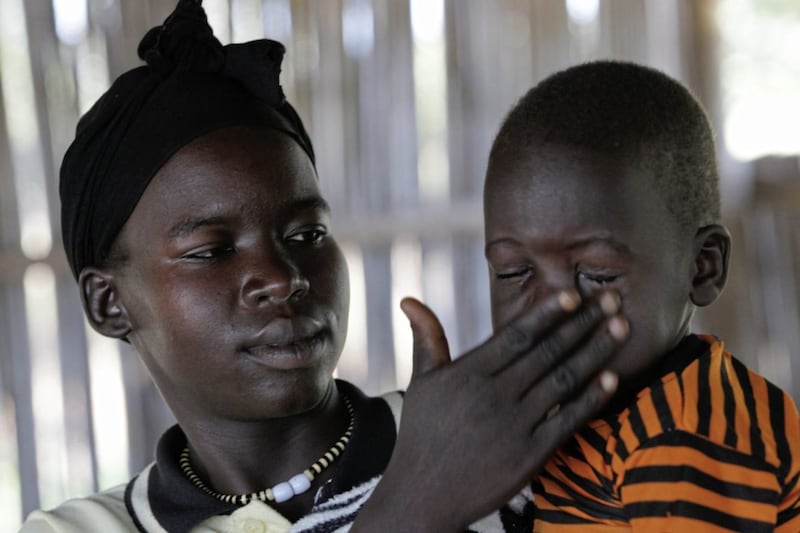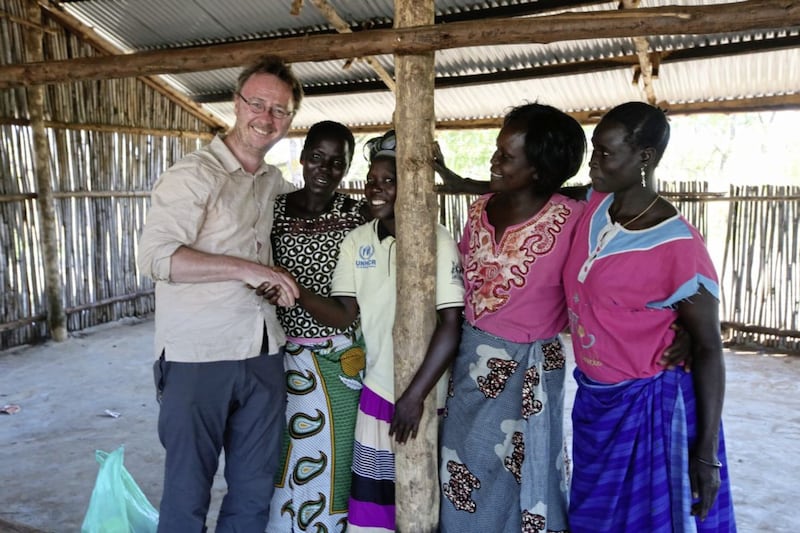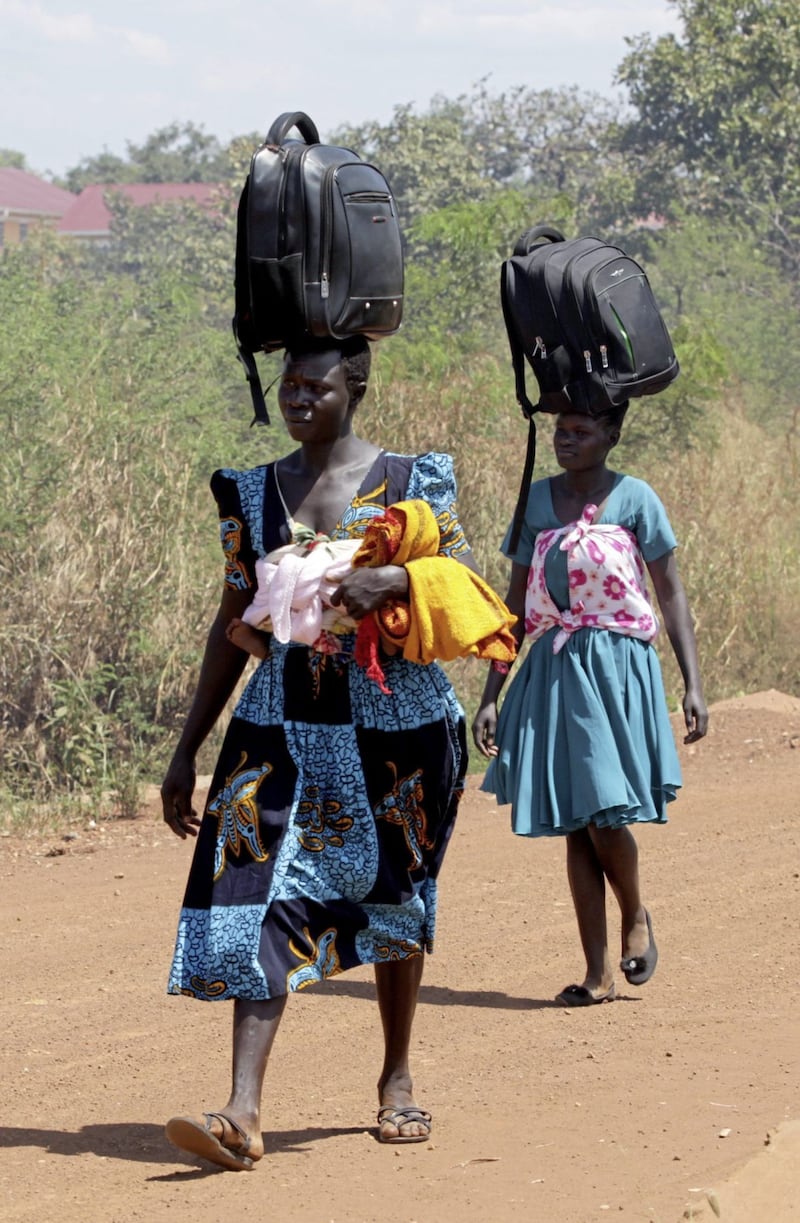BETTY was tending cattle in South Sudan when she was attacked and gang raped.
When her husband found out what had happened he left her because he thought she might be infected with HIV.
She was working with two other women when rebels attacked them.
“There were 18 men. Six came to each of us,” she said.
“We were divided into three groups of men, six, six and six. Each woman went with six men, six men on one woman, six men on another and six on the other.
“I didn’t fight back because they were men. I could not fight them.
“They never said anything. We were just in the garden looking after cattle, our tribe are cattle keepers so we were there taking care of the cattle.
“After the attack, they took all the cattle with them and said ‘You can go now.’ We were not able to walk, so we had to stay there until people looked for us and the government soldiers were told to come and look for the men and they came and carried us to the health centre.”
Despite her horrendous ordeal the mother of three said she bears no animosity towards the men who raped her.
“I cannot be angry with them because I don’t know them. You cannot carry anger against people you don’t know,” she said.
Betty, who was 22 at the time, fled to Uganda and is now living in Palabek Resettlement Centre where she is receiving both practical and psychological support from Trócaire sponsored organisations.
She has been tested for HIV and the results are negative but she is not convinced and further tests are being arranged.
“I am still worried because the men were suspected to be HIV positive,” she said.
“Whenever I go to the health centre, the result is negative, negative every time. But I am not satisfied with the exams. It is now nine months getting checked, since I was attacked in August last year.”
Following her attack Betty’s husband left her
“He feared I might have contracted HIV because of the men and he said he could not continue with me,” she said.
One million people have crossed the border from South Sudan into northern Uganda, fleeing a conflict that has left tens of thousands of people dead.
Charity Rhoda Labeng fled from Pajo after government forces seeking rebels flooded into the area.
"The government came in big numbers, saying they were coming to chase the rebels who were there," she said.
"And when they came, they were not only targeting the rebels, they were shooting anybody so everybody had to run.
"Everybody just left, we just grabbed our children and we just went. That is how we came to the border."
Even before her flight Charity, a mother of five, says life was difficult in South Sudan.
"We had rebels killing people, at the same time the government were also killing people, so with that movement was difficult. You cannot move because the moment you move you will already be at risk,” she said.
"Secondly you couldn’t get to health centres because roads were not good – nobody could move and bring medicines to the health centre.
"The schools were also really poor, so we were just worried all the time. Since there was war also people were not going into their gardens, so people had no food. With all that, it made us scared.

"You couldn’t send the children to school, food was a problem, it was very difficult for women.
"You could not get money, there was no food, all the time you need to run with children into the bush to hide from the rebels and the government.”
Charity said that both the rebels and the government troops were to blame for the violence.
“They were both the same, none of the two parties were good. They were all bad,” she said.
"The government soldiers were also killing. The rebels were also doing the same thing so we were never safe. All the time when you would hear the rebels were coming from one side, you would have run, but the government could be coming also from another side.
"They would not look and ask is it a civilian – so if you saw either of them you would have to run into the bush.
Charity said she decided to flee as government soldiers were closing in on the rebels.
"The women who were left behind, they were raped and they were beaten and they were killed by the government, because by that stage the rebels had run and were hiding in the bush,” she said.
"We don’t know who has survived and who has been killed. But the ones who have come here have told us they were raped, and how they have been affected.
"Even now when I think of South Sudan I feel pain in my heart.”
Charity says she feels safe in Palabek Resettlement Camp where life has a semblance of normality and where those affected by the violence are getting counselling.
“We have counselling and other things, so at least they are now becoming normal,” she said.

Inspirational women
Testing for HIV is carried out at Paluda Health Centre – a ramshackle collection of buildings constructed from timber, sacks and a tin roof. It is also maternity unit for Palabek and around 80 babies are born here every month.
The floor is concrete and files buzz around the patients as they wait on benches to be seen. Others wait outside in 35 degree heat.
Richard Nyeko, a Reproductive Health Officer, at says the clinic has diagnosed a number of patients with HIV and has around 300 confirmed cases on its patient register.
“Most of the cases we deal with are domestic rape, but there are other cases, including incidents of male rape,” he said.
“Women are more likely to come for treatment after they have been attacked but men who have been raped are reluctant to report it.
“People are very reluctant to talk about what happened to them – but if they treated within 72 hours of a rape they can be treated [with post-exposure prophylaxis (PEP) medication which can prevent infection].”
Many of the women who come to the clinic are referred by Child Protection Committee members, made up of fellow refugees who have been given their roles by their own communities.
They are given training and support by AWYAD (African Women and Youth Action for Development), a Trócaire-funded organisation working in Palabek.
The committee was established in November last year (2017) to deal with protection and wellbeing and deal with issues of defilement and rape.
Betty Amono said she had no previous experience of such work but was chosen because of how she relates to people
“We have to deal with domestic issues and manage people suffering from domestic violence,” she said.
“There is a lot of tension in households and domestic violence is the main problem, over things like selling food and keeping money in the house. It is mostly verbal.”
Her colleague Agnes Lino Atoo added: “We are trusted. We all came from different places but we have been brought together by conflict.”
Margaret Auma said alcohol consumption is a big issue in the refugee camp.
“It was a different situation back at home [in South Sudan] but the dynamics have changed and the men have nothing to do here so they drink – they drink to forget the trauma,” she said.
“They brew alcohol to make money but when they drink and come back home it affects the women. Women also drink but they are more careful, although some do drink too much to forget the trauma.”
There is particular concern about young people drinking.
“One of the tribes allow their teenagers to drink, but because of co-existence in the camp this is now spreading and other teenagers have started drinking as well,” Betty said.
“This as a serious issue as it exposes them to vulnerability. It is more a problem among boys and some of them are not engaging with education.”
When a case of domestic violence is reported to a committee member they assess if it can be handled at their level and try to deal with it, but the more serious cases are referred to professional counsellors.
Betty said: “We are known to people. They know our roles and reach to us first. If someone comes to us and reports rape or defilement we will take them to the clinic for medication and support.
“If someone reports being beaten, we will talk to the person carrying it out. The health centre has to inform the camp authorities of serious cases.”
Although the women say that their husband generally support their work because of the standing it gives them in the community, they have had to deal with their own domestic tensions.
“Sometimes our husbands will say that it is the woman who is the problem and they are worried it will come back on them [the husband] and fear that it could be a potential threat to them [from the other husbands],” Betty said.
The women also have to deal with instances of child abuse, which is often tolerated.
Agnes says: “Some tribes have different attitudes towards the age of consent and believe that once a girl reaches puberty she can get married. However, in Ugandan law the age of consent is 18.”

Background to the conflict
Just a few years ago North Uganda, the region where nearly one million South Sudanese refugees have fled, was itself a war zone.
Large parts were controlled by the notorious Lords Resistance Army (LRA), led by the now-fugitive Joseph Kony.
Kony was a member of the Acholi tribe, the third biggest of Uganda’s 60 tribes. The Acholi are also one of the main tribes in South Sudan, and their allegiance is to this ethnic group is stronger than the international borders established by colonial powers.
Kony used a mixture of religious fundamentalism and dissatisfaction among the Acholi to build support for the LRA, but then turned his terror on his own people, kidnapping boys as young as eight and brutalising them by forcing them to kill one another and members of their own families to prove their loyalty.
Young girls were also kidnapped and forced to become ‘sex slaves’ to members of the LRA.
The LRA was supported by the government of Sudan in retaliation for the Uganda government supporting the Sudan People's Liberation Movement/Army whose separatist war eventually led to independence for South Sudan in 2011.
By 2005 much of the population of northern Uganda in the regions surrounding Kitgum and Gulu were displaced and aid-dependent, as they fled LRA and government violence.
A government crackdown and alienation from the LRA by the Acholi who had suffered under them saw the ranks of LRA fracture and their leaders scattered. Some have been captured and tried, although Kony is still at large – with a $5 bounty on his head – and rumoured to be in either South Sudan or neighbouring Democratic Republic of Congo.
Memories of their own trauma just a few years ago plus tribal bonds have nurtured Ugandan goodwill towards the million people who have been given shelter in their midst.
In South Sudan, following independence in 2011 relations between the country's government allies quickly deteriorated into bloody civil war.
Tens of thousands of people have been killed and millions displaced.
The economy has collapsed as a result of both the violence and crop failure due to climate change.
According to the UN the "relentless conflict" in South Sudan has left more than six million people facing crisis levels of hunger.
The organisation says the country is now facing one of the world's worst humanitarian crises.
Trócaire partner groups in Uganda
Trócaire uses money raised in Ireland to help fund three partner groups in Palabek Refugee settlement.
Africa Women Rising (AWR) supports small scale gardening on individual plots, helping women in the camp who want to start farming on the small plots they have but lack the necessary tools and seeds. Trócaire provides support through provision of farm inputs and training, support to host/refugee groups on crop farming. AWR has already started a new arrangement with the host community to collaborate with refugees for large-scale crop farming. The project will build on the experience from that pilot.
AWYAD (African Women and Youth Action for Development) works to create women and girls-only space (constructed using local materials). Conduct mentoring programmes and promoting peer support networks for women and girls. Promote social and cultural activities for based on women’s suggestions. Establish and facilitate training to community protection committees as first responders. Facilitate first level case management and psycho-social first aid training to partner staff. Strengthening capacities of local leadership (police) on prevention of sexual and gender-based violence, referral and case management. Strengthening community structures on alternative dispute resolution and informal justice mechanism. Contribute to the prevention of protection risks and respond to survivors needs (stoves, solar lights and dignity kits).
CESVI provides business support to small trade, start-up capital and training. Vocational skill training on key skills that can be utilised in and around the settlement. After the skill training, the groups are supported with the necessary material and start-up capital to start the business.
Christmas appeal
Trócaire was established by the Catholic Church in 1973 as a way for Irish people to donate to development and emergency relief overseas. Its dual mandate is to support the most vulnerable people in the developing world, while also raising awareness of injustice and global poverty in Ireland.
In Palabek,Trócaire is providing kitchen gardens, trauma counselling, skills training so people can generate an income and fuel-efficient stoves.
It is also working with partners to ensure the most vulnerable are protected and children get to go to school.
Patrick Abongi is Trócaire's humanitarian programme manager in the Palabek region.
“The need here is acute. There are 33,000 South Sudanese refugees in this area and many of them have arrived with absolutely nothing,” he said.
“Trócaire is working with our partners on the ground to provide life-changing support to people in the most desperate need. We would not be able to do this without the support of the people in Ireland, north and south.”
Donate by calling 0800 912 1200 (1850 408 408 in ROI) or visit trocaire.org/donate.







